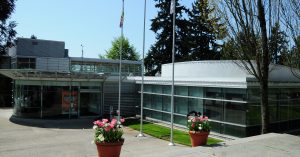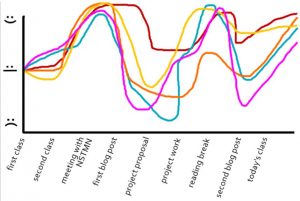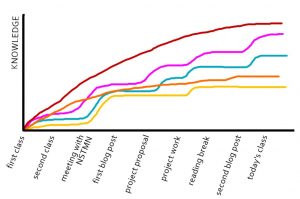Welcome to the third blog entry in our four-part blog series! Much like this blog series, we are about 75% into our course here in LFS 350. The last quarter may well be the busiest! In today’s entry, we have some exciting updates to share. As well, we hope to explore a plan for how to tackle the last bit of the project with the same degree of ferocity we have engaged in thus far. Need more proof of said ferocity? Continue reading!
Weekly Objectives and Achievements

The Municipal Hall in all its glory.
On Thursday, March 9th, three of our group members attended the North Shore Table Matters Network roundtable meeting at the District of North Vancouver Municipal Hall. The trio provided a short presentation on our project and discussed our progress with our community partners. It was an immensely gratifying experience. In a boardroom emblazoned with North Shore food system veterans, for but a brief moment we were the experts. And the responses of the board members were a multitude of emotions ranging from enthusiasm to curiosity to candid appreciation. They seemed quite impressed to hear that our updated database of food assets had nearly doubled in size in respect to the original—from 50 recorded food assets to over 90!
Though our meeting was—in the essence of briefness—well, brief, our project managed to spark some questions and discussion. This allowed us to find answers to some of our own questions we were facing, including who best to contact to obtain information about certain food assets, and how to search for those which were not already available on the internet. More than anything else though, the receptiveness from our community partners really evoked a sense of perspective for us. This notion that this project can be profoundly useful to the community has now been reinforced by professionals in the community itself, providing our group with an unparalleled sense of validation. This will keep us propelled as we prepare for the completion of our project (more on this below, by the way).
Approaching the denouement of our journey, it is now more crucial than ever to stay on top of our weekly goals. Our main goal has largely been centered around the completion of the food asset database. As we are also approaching the deadline of our individual term papers (and midterms in other courses), it is acknowledged that the database may receive a little less love this week. With this in mind, however, we have outlined the ingredients to the cocktail that is the final few weeks of our project (more on this below), and it is becoming evident that completing more now will give us more time to flesh out our final poster presentation (more on this soon!).
Moments of Significant Change Workshop
Description:
In our fifth tutorial session, our group was asked to reflect on moments of significant change that we have encountered throughout the term, and to draw two graphs representing the trajectory of our emotions and learning as we faced these moments over time. This fun and engaging activity really helped us to visualize how we have grown as a group, and especially how the challenges of project work have shaped and reshaped our experience in LFS 350. As a group, we decided that many of the moments that were significant to our personal, group, and project development were our interactions with our community partners, doing our project work, and the assignments we have had to complete for the course. While plotting these graphs, our team realized that most of the members did not enjoy writing the blogs or project proposal as much as they enjoyed gathering data and interacting with the community. However, everyone agrees that these tasks and activities helped them gain a better knowledge and understanding through reflection on our project work.
The above left graph shows the change in group members’ attitudes and emotions, along a spectrum from positive to negative, over the course of the semester. The above right graph shows our knowledge gain over time. The X-axis is organized around some of the moments of significant change we encountered as the term went on.
Reflection
After completing our graph and looking at other groups’ charts we realized that we were not the only group that felt discomfort during the times we had an assignment due; be they blogs, quizzes or papers. Realizing that almost all of the groups were faced with challenges and struggled emotionally at the times of submission gave us comfort not because we saw others struggling, but because it helped us acknowledge that this course was perhaps designed in a way to expose us to messy situations and anxiety, which are necessary stepping stones for us to grow and learn from such situations in order to succeed in our future goals (Freakonomics, 2015). As Shulman mentions, these anxieties felt during group work will not only teach us the ways to cope with the raised tensions, but also prepare us for experiencing and working with such tensions in the future, as professionals (Shulman, 2005).
Other groups like ours seemed to agree that, since the beginning of this term, the amount of knowledge they acquired increased considerably throughout the term; first at a high rate, slowing down as the term progressed. Perhaps this is an indication that this course is designed to equip us with more than just academic knowledge, transcending traditional pedagogy in order to provide learning through experience. This course begins by developing contextual issues around food security and food system sustainability, and then challenges us to engage this knowledge within the context of our community projects. Shulman (2005) mentions that learning for the sake of application not only requires a process of commitment and knowledge-formation that dichotomizes traditional learning, but amplifies the learning experience when included in real-world application. We can attest to this through the gratification exemplified in our Table Matters board meeting presentation. Furthermore, we feel that as we continue to work together with each other and with our community partners in a real-world setting, we are breaking away from the limits of learning by being exposed to risk and uncertainty (Shulman, 2005). This challenges each of us to think differently while we work towards our goal. We believe this way of thinking is indicative of workplace realities and more conducive to community change than simply possessing academic ways of knowing on its own.
The Graceful Dismount
As we are getting closer to last weeks of this term, it is necessary that our group come up with a set deadline for data collection to ensure that the project is completed in a timely manner.To make things more efficient with data collection, we have divided up into groups of two and each group has taken two categories to work on. This way we can get through more categories and help our community partner more. We plan to meet and report our progress regularly in order to keep up with each other and make sure everyone is on the right path. Eventually we plan to have a final meeting before everything is done to have a final look before submission. Our goal it to finish data collection for the food asset database within the next two weeks, after which our community partners will launch the online map.
As a group, we hope to be able to test this map in the North Shore community once is has been publicized, whereupon we may get a sense of how effective a tool it can be for helping community members locate and access food assets. We will test the tool to evaluate how user-friendly it is individually; however, figuring out how to test out its reach within the community is something that is still very much up for debate. Although we have some ideas, the opinion of our community partner will ultimately guide us. Will we reach out to South Vancouver Neighborhood House (or other organizations that emphasize community food security) and ask them to spread the word/use it for future projects? Or will we find ourselves back at our original meeting spot at Lonsdale Quay soliciting to the public? And furthermore, how can we better reach people that may not be reached through either approach—under the time constraints set upon us? You will have to tune in to our fourth (and final!) blog post to find out!
References
Cohn, G.(Producer). (2015, May 05-20). Failure is your friend: A freakonomics Radio Rebroadcast [Audio podcast]. Retrieved from http://freakonomics.com/podcast/failure-is-your-friend-a-freakonomics-radio-rebroadcast
Shulman, L. S. (2005). Pedagogies of uncertainty. Liberal Education, 91(2), 18–25. Retrieved from http://files.eric.ed.gov/fulltext/EJ697350.pdf

